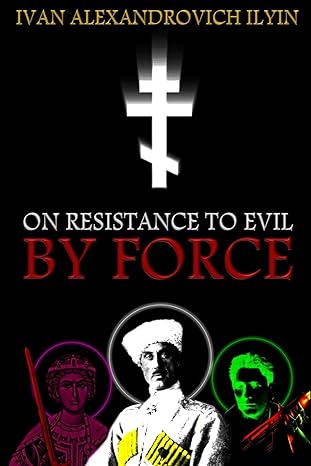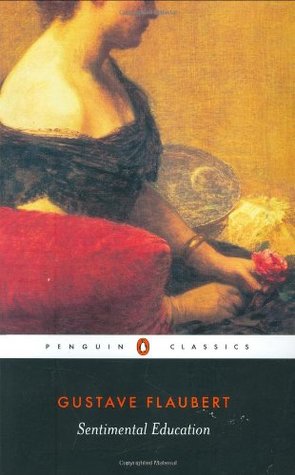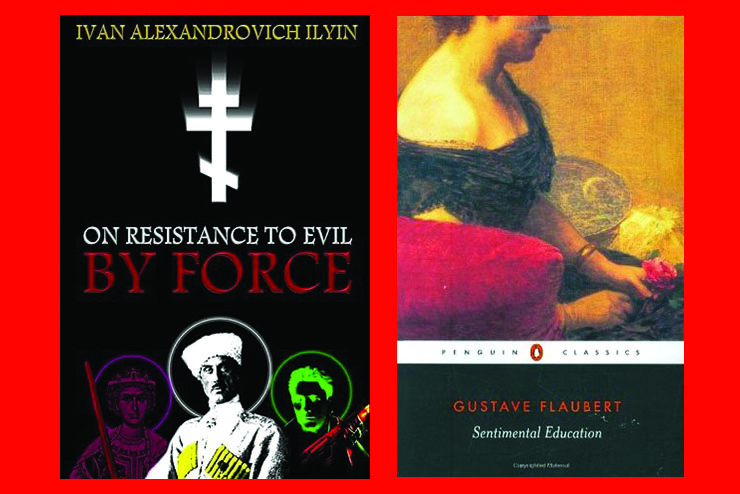
Ivan Ilyin’s anti-Western stance should neither be glossed over nor exaggerated. A keen student of Hegel as well as of the Russian Orthodox religious heritage, Ilyin believed it crucial for a nation-state to cultivate in its people pravosoznanye, “legal consciousness,” which is to say a strong civic-mindedness that acknowledges law as a spiritual reality to be internalized, not a system to cynically manipulate.
Ilyin’s On Resistance to Evil by Force lays responsibility for the psychotic violence of the Bolsheviks at the feet of well-meaning but morally craven heretics like Count Leo Tolstoy. Brilliant as the author of War and Peace may have been as a novelist, to Ilyin he epitomized effeminate pseudo-Christianity: high-sounding teachings that conceal an underlying “sentimental nihilism.”
The Orthodox see in man “an individual spirit with a living relationship to a living and personal God, with a sacred right to take part in the life of a God-created world,” Ilyin wrote. In contrast, Tolstoy imagined man as “a suffering subject and thus an object of pity and compassion.”
According to Ilyin, Tolstoy teaches that “the ultimate goal of humanity is to pity” and that “righteous activity consists in protecting everyone from suffering.” Hence, Tolstoy’s otherworldly rejection of civic duties, religious hierarchy, and ultimately of culture, tradition, form, and human life as such. “The inevitable conclusion,” Ilyin warned, “is, finally, the denial of the motherland, its being, its state form and the need for its defence.”
Ilyin insists that “love for one’s neighbor is love for his spirit and his spirituality, and not just pity for his suffering animality.” He continued:
love is in no way reducible to animal sympathy, which serves to soothe both he who sympathizes and he who is sympathized with. A person who has extinguished the image of God in himself is not in need of a weak-willed ‘yes,’ but instead a sternly condemning ‘no,’ and this halting and sobering ‘no’ can and should have its true source in the love for God in heaven and for the Divine in the fallen and spiritually extinguished soul.
For modern men of the right, then, Ilyin believes that the task is to pass through a spiritual strait between Scylla and Charybdis, avoiding the compromise, corruption, and cowardice typical of liberals but also steering clear of the spirit of savage brutality that had seduced the Bolsheviks and brownshirts.
—Jerry Salyer

Madame Bovary was, in the days before we sent the core curriculum to the politically correct guillotine, a novel one had a good chance of reading if one made it through university. This was true even in the non-Francophone world.
As profound as it is, it is not even Flaubert’s most important novel. That accolade should be reserved for Sentimental Education, written more than a decade later. It is the story of Frédéric Moreau, an ambitious and restless young man who flees life in his quiet natal town for the promise of romantic adventure, fame, and money in Paris. He pursues various women and various paths to material success, none with much long-term conviction and all without any lasting achievement to show for his efforts.
His fickleness and lack of moral substance are of a piece with the social world he inhabits, the Paris of the years just before the 1848 Revolution through the end of the Second Empire in 1870. Flaubert’s view of French society during this period was relentlessly critical. The Revolution had vaporized all the stability and permanence of the Ancien Régime. The monarchy’s restoration after Napoléon’s fall could not put the shattered culture back together. What took its place was little more than an anarchist feeding frenzy of constant acquisitive competition. Each atom in French society senselessly and soullessly rushed about in pursuit of every fleeting sensation, accomplishing nothing. It was insatiable, rootless, and amoral to the core.
By the novel’s end, Frédéric is an aging failure on all counts, with nothing to show for the several decades of his young adult life save regretful memories. It is with wistful melancholy and a listless nostalgia for his lost youth that the story concludes.
Flaubert’s politics were complicated; he was both anti-bourgeois and anti-revolutionary. He is best understood as an advocate for aristocracy. He hoped for an artistic elite that might produce a value system that eluded the crude materialist vulgarity of capitalists and revolutionary anti-capitalists alike. He and Honoré de Balzac were formidable 19th-century anti-revolutionary novelists who opposed their leftist counterpart, Émile Zola. Balzac wrote more than Flaubert, but the latter is the better stylist and gives a more trenchant critique of the emerging secular mass society that eventually became the depressing France of “Manu” Macron. Sentimental Education reveals the bankruptcy of a society built solely on commerce and individualism, without faith or tradition.
—Alexander Riley

Leave a Reply